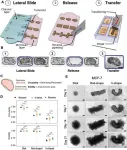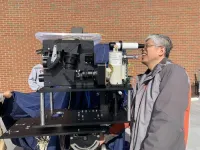AI finds undiagnosed liver disease in early stages
83% of patients who met MASLD criteria were not diagnosed
2024-11-16
(Press-News.org) SAN DIEGO, California (Nov. 16, 2024) — Liver disease, which is treatable when discovered early, often goes undetected until late stages, but a new study revealed that an algorithm fueled by artificial intelligence can accurately detect early-stage metabolic-associated steatotic liver disease (MASLD) by using electronic health records. The study was scheduled for presentation today at The Liver Meeting, hosted by the American Association for the Study of Liver Diseases.
“A significant proportion of patients who meet criteria for MASLD go undiagnosed,” said Ariana Stuart MD, a resident at University of Washington Internal Medicine Residency Program and lead author of the study. “This is concerning because delays in early diagnosis increase the likelihood of progression to advanced liver disease.”
Researchers used an AI algorithm to analyze imaging findings in electronic health records from three sites within the University of Washington Medical System to identify patients who met the criteria for MASLD, the most common form of liver disease, affecting 4.5 million adults in the United States. While 834 patients met the criteria, only 137 actually had an official MASLD-associated diagnosis in their record. This left 83% of patients undiagnosed even when data in their electronic health record showed they met the criteria for MASLD.
“People should not interpret our findings as a lack of primary care training or management,” Stuart said. “Instead, our study shows how AI can complement physician workflow to address the limitations of traditional clinical practice.”
MASLD occurs when fat isn’t managed properly in the liver and is often associated with other common diseases such as obesity, Type-2 diabetes, and abnormal cholesterol levels. Early diagnosis of MASLD is key because it can quickly progress to more severe forms of liver disease, but many individuals in this early stage are asymptomatic, making diagnosis challenging.
Ariana Stuart, MD, will present the study, “Artificial Intelligence for Early MASLD Identification in the Electronic Medical Record,” abstract 2360, on Saturday, Nov. 16 at 8 a.m. PST.
###
About The Liver Meeting®
The Liver Meeting® brings together clinicians, associates and scientists from around the world to exchange information on the latest research, discuss new developments in liver treatment and transplantation, and network with leading experts in the field of hepatology.
About AASLD
AASLD is the leading organization of scientists and health care professionals committed to preventing and curing liver disease. We foster research that leads to improved treatment options for millions of liver disease patients. We advance the science and practice of hepatology through educational conferences, training programs, professional publications and partnerships with government agencies and sister societies.
END
ELSE PRESS RELEASES FROM THIS DATE:
2024-11-16
The American Society of Tropical Medicine and Hygiene and the Bill & Melinda Gates Foundation Announce New Research Fellowship in Malaria Genomics in Honor of Professor Dominic Kwiatkowski
New Orleans, Louisiana, November 15, 2024 — The American Society of Tropical Medicine and Hygiene (ASTMH) is proud to announce the establishment of the annual Kwiatkowski Fellowship, a new research initiative in partnership with the Bill & Melinda Gates Foundation (BMGF). This fellowship honors the life and scientific contributions of the late Professor Dominic Kwiatkowski, a pioneer in the field of malaria genomics.
The ...
2024-11-16
Exposure to blue light, like that from smartphones or tablets, may accelerate bone growth and bone age, leading to early puberty in rats. This research, presented at the 62nd Annual European Society for Paediatric Endocrinology Meeting in Liverpool, sheds light on how the use of blue light-emitting devices could impact growth and development and raises important questions about the long-term health effects in children, who are increasingly exposed to screens from a young age.
As children grow and develop, long bones such ...
2024-11-16
Swedish young men who went through late puberty during adolescence are more likely to use healthcare services later in life, according to research presented at the 62nd Annual European Society for Paediatric Endocrinology Meeting in Liverpool. The findings of this long-term study suggest that delayed puberty in boys may have harmful effects on their health in adulthood and could potentially lead to new follow-up healthcare routines in the future.
Puberty in boys typically starts between the ages of 9 and 14. However, about 2% of boys have delayed puberty, in which puberty does not begin by age 14. In most cases, delayed puberty is constitutional – a pattern of growth and development ...
2024-11-16
A new paper in the journal Child Development shows how some aspects of family interaction among Indigenous people in Guatemala have fundamentally shifted with rapid globalization, yet families have still maintained a unique level of harmony in their interactions.
UC Santa Cruz psychologist Barbara Rogoff has been working with Mayan communities in San Pedro la Laguna, Guatemala for five decades and noticed a sophisticated type of fluid, inclusive collaboration among children from these communities. During a research study 30 years ago, mothers and their two small children interacted in a very distinct way, ...
2024-11-15
Researchers at the University of Toronto’s Faculty of Applied Science & Engineering have designed a new microfluidic platform that allows forunprecedented control and manipulation of tumor shapes — a largely unexplored area with great potential to advance cancer research.
The work, led by Professor Edmond Young, offers new insights into how the shape of tumours can predict cancer cell behaviour and aggressiveness, which opens new pathways for more personalized and targeted cancer care.
“While there are several platforms for in vitro modelling of spheroids — ...
2024-11-15
The Speech Accessibility Project has two new partners — The Matthew Foundation and the Massachusetts Down Syndrome Congress — as it continues to recruit adults with Down syndrome who live in the United States and Canada. The project also allows residents of Puerto Rico to participate.
The project is also recruiting those with ALS, cerebral palsy and Parkinson’s disease, as well as individuals who have had a stroke.
“The research team has learned that connecting with trusted partners is key to showing the credibility of our work and how much it could improve the lives of people with disabilities,” said Mark ...
2024-11-15
Fitting in a workout after a long day of sitting at a desk might not be enough to compensate for the impacts of sedentary behavior on the heart. Investigators from Mass General Brigham, found that excessive sedentary behavior (waking activity with low energy expenditure while sitting, reclining, or lying down and not including hours spent sleeping at night) was linked to increased risk of heart disease, especially heart failure and cardiovascular death, and that these risks could be significantly reduced by substituting sedentary time for other activities. They also found that meeting guideline levels of moderate-to-vigorous physical activity may be insufficient on its own to reduce cardiovascular ...
2024-11-15
A new UC Davis Health study has uncovered how Salmonella bacteria, a major cause of food poisoning, can invade the gut even when protective bacteria are present. The research, published in the Proceedings of the National Academy of Sciences, explains how the pathogen tricks the gut environment to escape the body's natural defenses.
The digestive system is home to trillions of bacteria, many of which produce short-chain fatty acids (SCFAs) that help fight harmful pathogens. But Salmonella manages to grow and spread in the gut, even though ...
2024-11-15
The rod-shaped tuberculosis (TB) bacterium, which the World Health Organization has once again ranked as the top infectious disease killer globally, is the first single-celled organism ever observed to maintain a consistent growth rate throughout its life cycle. These findings, reported by Tufts University School of Medicine researchers on November 15 in the journal Nature Microbiology, overturn core beliefs of bacterial cell biology and hint at why the deadly pathogen so readily outmaneuvers our immune system and antibiotics.
"The ...
2024-11-15
NASA researchers Guan Yang, Jeff Chen, and their team received the 2024 Innovator of The Year Award at the agency’s Goddard Space Flight Center in Greenbelt, Maryland, for their exemplary work on a lidar system enhanced with artificial intelligence and other technologies.
Like a laser-based version of sonar, lidar and its use in space exploration is not new. But the lidar system Yang and Chen’s team have developed — formally the Concurrent Artificially-intelligent Spectrometry and Adaptive Lidar System (CASALS) — can produce higher resolution data within a smaller space, significantly increasing efficiency compared to current models.
The ...
LAST 30 PRESS RELEASES:
[Press-News.org] AI finds undiagnosed liver disease in early stages
83% of patients who met MASLD criteria were not diagnosed

